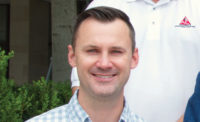Focusing on the Fundamentals: A Commitment to Service Has Paid Off for Core Roofing

Core Roofing Systems is a commercial contractor headquartered in Alpharetta, Ga. Pictured here are (from left) Steve Taylor, Steve Vicknair, Buck Hall, Chad Greene, Dusty Keppen, David Hunt and Dusty DeVore. Photos by Aaron Moon, Pics by the Moon©.

Dusty DeVore founded Core Roofing in 2002. Two years ago the company also opened a location in Orlando, Fla.




Dusty DeVore went to Columbus State University in Columbus, Ga., on a baseball scholarship, where he set school records for the most home runs in a season and career. He’s now the president of Core Roofing Systems in Alpharetta, Ga., and his records have since been surpassed, but DeVore still has an athlete’s mentality. He believes that in business as well as sports, the key is to focus on the fundamentals. Do all the little things right, and the big things will take care of themselves.
It’s a belief that was put to the test during the recent recession. “Four years ago, one of the things we focused on was, ‘Don’t watch the news.’ We’d kick off meetings with that all the time,” DeVore recalled. “We can’t control everything that goes on out there, but what we can control is the quality, the growth and the communication at our company. We can focus on the little things. I use a lot of baseball references. Can we bunt a guy over? Can we steal a base? Can we hit the cutoff man? If we can do those things, these next few years are going to be fantastic. And that’s what’s happened. We were able to grow every year. We know we can survive those tough times by focusing on the little things that matter because all the little things add up to the big stuff. The next thing you know, you’re hitting a grand slam or a three-run home run that really pays off.”
Core Roofing has 110 employees and specializes in commercial work, the majority of it re-roofing and maintenance. DeVore founded Core in 2002, when he left another company to go out on his own. It was a tough transition. “I learned real quick at a very early age what not to do,” he said. “In those early years I got my master’s, so to speak, in roofing by making some mistakes, and I certainly paid for it.”
The company found its footing concentrating on service and maintenance work. “I realized that at that time people weren’t going to spend a lot of money on re-roofs because they weren’t moving into shopping centers and they weren’t moving into office buildings — they were moving out,” he said. “We had to figure out a way to extend the life of the roof because they didn’t have the money to make these big capital expenditures. So what we did was we went to these building owners and said, ‘Give us an opportunity to extend the life of the roof. Let’s buy you another year or two with this roof until you are able to fill this building.’ That’s almost by mistake how we ended up starting our service and maintenance department.”
The service department grew, and soon work spilled over into the re-roofing division. “We excelled when given a chance to extend the life of the roof,” DeVore said. “We got another several years out of it, and the next thing you know, if we did a good job and responded within 24 hours, we were able to pick up some customers on the leak and maintenance side, and then they would ask us back to negotiate or ask us to be ready to be part of the process for a re-roof.”
As the re-roofing and service divisions continued to grow, the company then added some public bid work to round out its offerings. That way, DeVore reasoned, if one sector of the market is shaky, the others will hopefully pick up. The service and maintenance division is run by David Hunt, the re-roofing division is headed by Steve Taylor, and estimating and bid work for government and new construction is handled by Dusty Keppen. Two years ago the company opened an office in Orlando, Fla., which is run by Todd Shannon.
The company’s emphasis on extending the life of the roof has served it well. “Our rule of thumb here has always been, ‘Be honest with the customer,’” said DeVore. “If they don’t need a re-roof, tell them they don’t need a re-roof. Tell them you can get them more time and more life out of their roof if they are not ready to put that money into a new roof. We continue that now. So many contractors are guilty of going out and looking for the big job. They don’t want to commit to service because, quite frankly, it’s the hardest part of the business, in my opinion, to manage and maintain. On a busy day — it’s raining here today — we might get over 100 leak calls, and to manage the details on that many invoices at one time can be difficult if you’re not accustomed to it. So a lot of contractors go out and try to sell customers on a new roof by showing them all of these problems. But I think if you are honest with the customer and upfront with them, and you can build a relationship and earn trust with these smaller ticket items, then you hopefully earn a shot to do the big-ticket items.”
|
Masterful Marketing
Core Roofing sponsors PGA Tour golfer Roberto Castro, who wears the Core Roofing Systems logo on his sleeve. “He’s a rock-solid guy that represents our company at the highest level,” said DeVore. The company has sponsored Castro for four years, including his time on the Nationwide tour. The two met at a golf club and DeVore joked about how good Castro would look sporting a Core Roofing logo. A short time later, it was a reality. “I explained our business philosophy and how I perceive the business world and the way we treat people, from our manufacturers to our employees to our customers, and it coincided with a lot of his beliefs and the way he goes about his business,” DeVore said. DeVore believes their shared values make sponsoring Castro a perfect fit. “He’s a great ambassador for our company,” he said. “We’ve taken him out to play golf with customers and manufacturers, and they just gravitate to him. He’ll give them short game lessons and swing lessons and have a beer with them and tell them about life on the PGA Tour.” In April, DeVore took some clients to see Castro in action at the Masters in Augusta, Ga. While Castro did not make the cut at the Masters this year, that’s just the nature of the game, according to DeVore. “I’m a golf fanatic,” he said. “I love golf and play it a lot. I think it’s such a great game because it relates to business so well. It’s always evolving and you can never perfect it." |
Communication is the key to meeting customers’ needs, according to DeVore. “We rely on our communication in the company — from our Monday morning meeting back out to our guys in the field and back to our customers,” he said. “Our people — even people in the office — are constantly communicating. There has to be a way that we are getting back to the customers or responding to the tenants that lease space from the property owners. We want to give them the information they need. So it starts on a Monday morning, and throughout the entire week there’s follow up, there’s communication back with the customer, and there’s communication with each other about what happens back in the office. I think that’s the number one recipe for success for us: overkill on communication.”
The company uses a team approach to help out with clients. “We always think that two is better than one, so there are times when two of us will go in to see a customer or a client,” DeVore said. “We try to manage the relationships directly with one person, typically, but also we think it’s very important to let the customer know that a general manager or someone in a manager’s position or the owner of the company is talking to them, and is able to touch them and understands their concerns and needs as well. We want to understand their business, and if we need to come back to the office and put our heads together on the best way to handle a strategic account, then we can come up with the best program to fit that. Because every account I do believe is different, and you have to be able craft around each specific strategic account.”
The same approach goes for the company’s business partners, who are integral to its successLef. “We want to treat our manufacturers and our suppliers exactly the same way we would treat a customer,” he said. “I believe you should treat both of them the exact same way and communicate with both of them the exact same way. We’ve been very fortunate to have Heely-Brown, which is a big supplier here, and to their credit they stepped out on a limb when we were getting going and nobody knew us, and gave us an opportunity to start selling. Without Heely-Brown here we certainly would not have the success that we have. And, quite frankly, Johns Manville jumped on board with us at the very beginning, and we owe them a lot of credit as well.”
A Safe Jobsite, Quality Workmanship
The emphasis on the fundamentals begins and ends with safety and quality workmanship, according to DeVore. Every new employee goes through a safety training program, and all superintendents and service technicians go through OSHA 30-hour training. A safety analysis is done on every jobsite before a job begins, and the superintendent on the site acts as a safety monitor. “Safety is the number one topic in our company and the first thing we discuss in our company meetings,” he said. “If a guy is out of line with safety, he gets a vacation for the rest of the day, and if he is out of line again, he is suspended. We take safety very seriously.”
Superintendents are assigned to every jobsite to check up on quality as well as safety. “It’s not a cliché that the better work you do, the more work you get — it’s an absolute fact,” said DeVore. “When you have a superintendent on every single jobsite, number one you have a better communicator at the point of contact, and the superintendent can ensure the quality. We train our superintendents to act as inspectors. We want them to act as a consultant of the other company. We want them to act as a manufacturer who is signing off on that warranty because when that manufacturer does come out there, we don’t want a punch list. We challenge ourselves and say, we don’t want one punch list, and certainly that has paid off. That has paid tremendous dividends. It can be chaos if you’re not managing a job, and we’ve certainly seen the callbacks dwindle. We just don’t have them anymore.”
Another thing the company doesn’t have is much employee turnover, said DeVore, who credits his dedicated employees as the driving force behind the company’s success. “We’ve got a great group of people, and that’s what makes our company is the people,” he said.
“This business is different every single day, and that’s what makes it exciting to come to work. I think the people here are excited to get up and to come to work here. The trust that we have within the group, within our employees, and the communication, that’s what makes our company successful. We work because we love it, and it doesn’t feel like work.”
Looking for a reprint of this article?
From high-res PDFs to custom plaques, order your copy today!











